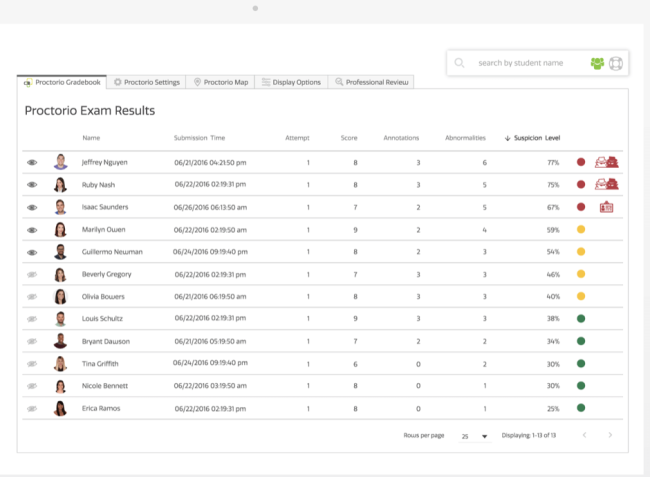You have /5 articles left.
Sign up for a free account or log in.

Proctorio exam results demo
Proctorio
The University of Illinois at Urbana-Champaign said last week that it does not plan to renew its emergency contract with Proctorio, one of several online proctoring programs whose client bases have expanded during the pandemic but which remain controversial among students and professors alike.
The university began using Proctorio last spring, in response to the rapid shift to online instruction. It will not renew the contract past this summer. In a memo to faculty members announcing the decision, university administrators cited the “significant accessibility concerns” associated with Proctorio, along with other worries about privacy, data security and equity.
Accessibility and Other Concerns
This echoes ongoing complaints from many students and professors about cheating-prevention software in general, including that these programs don’t always work for students with visual impairments who need screen readers. These programs have been known to repeatedly flag as suspicious students who self-stimulate or “stim” during exams. Many students report increased text anxiety due to feeling surveilled. Even the glare of glasses sometimes interferes with the software.
In addition to disability-specific concerns, privacy and equity advocates object to cheating-prevention software’s requirements that students show their testing environments -- often their private quarters -- prior to starting an exam, or verify their identities with personal information or IDs. Nonwhite students have reported that facial detection software struggles to recognize their skin tone, and students with headscarves sometimes get flagged. Students need sufficient network bandwidth and a webcam for it to work at all. They must also have a quiet, uninterrupted space for the testing period, which isn’t always possible, especially with so many students living at home during COVID-19.
Proctoring services have pushed back hard on this criticism, pointing out that they merely flag potential cheating, and that professors can review each case before making any decision regarding the student’s academic integrity. Programs’ settings can also be adjusted to avoid some accessibility issues. Proctorio says it never sells students' information and that that data is protected via "military-grade, zero-knowledge encryption." But online proctoring’s deepening relationship with higher education remains uneasy.
In September, Proctorio sued ed-tech specialist Ian Linkletter for tweeting out Proctorio faculty training videos previously posted to YouTube. Students at the University of British Columbia, where Linkletter works, also signed a petition asking the institution to stop using Proctorio out of concerns about student privacy that Linkletter shares. Thousands of students continue to fight use of Proctorio at California State University, Fullerton, saying in a separate petition that it's "unacceptable in any circumstance for the university to track our keystrokes, access our computers’ cameras, film us in our homes, and use AI technology to determine we look 'suspicious.'"
Several Democratic senators told Proctorio and two other proctoring platforms in December to increase transparency surrounding their technology and policies. Senator Richard Blumenthal of Connecticut told TechCrunch that the services "claim they don’t have problems with bias, yet alarming reports from students tell a different story."
Responses thus far from the companies are the "first step in learning more about how they operate, but much more transparency is needed into the systems that have the power to accuse students of cheating," Blumenthal said. "I will work on every fix necessary to ensure students are protected.”
Students at Illinois have campaigned against Proctorio. "We as students understand the need to uphold academic integrity and the legitimacy of the university, however, there has to be a better way," reads a student petition with more than 1,000 signatures. "Whether that be through the use of Zoom based proctoring, project-based learning, or more rigorous take-home exams. Many professors are already effectively using these alternatives and we as students are asking that those who insist on using Proctorio should be required to switch over. The protection of our data and privacy should always come first."
"Proctorio is not only inefficient, it is also unsafe and a complete violation of a student's privacy," the petition also says. "Forcing students to take exams through what has effectively been described by many as spyware, is unfair to both students and their data. Proctorio can read data from websites you visit, access your downloads, view and capture the content of your screen, [and] access your apps and privacy related settings. According to Proctorio's own terms of service agreement, 'You agree to allow Proctorio to monitor you by webcam, microphone, browser, desktop, or any other means necessary to uphold integrity.'"
A quick scan of social media provides some additional insight into students' frustrations with the software.
In their memo to faculty members, Allison Kushner, Illinois’s campus Americans With Disabilities Act coordinator, and Kevin Pitts, vice provost for undergraduate education, said that Proctorio usage on campus is not high. Many instructors have already opted for alternative forms of assessment or alternative means of proctoring, such as the College of Engineering’s Computer Based Testing Facility. Kushner and Pitts also recommended that instructors consider using alternate forms of assessment this spring, even before the Proctorio contract runs out.
“Concerns have been raised about the usage of Proctorio on our campus, including issues related to accessibility, privacy, data security and equity,” the memo says. “Some of these concerns are specific to Proctorio, while others seem to arise to a more general philosophical opposition to remote exam administration and/or proctoring. We take these concerns seriously and have been working with [Illinois’s Center for Innovation in Teaching and Learning], Tech Services and the ADA Division of the Office for Access and Equity to further understand and address those concerns.”
Proctorio did not respond to a request for comment about the change.
Pitts said Friday that Illinois wasn’t so much “cutting ties” with Proctorio as reminding faculty members that “the license procured under emergency action,” sanctioned by the state of Illinois, “is coming to an end.”
The university is also investigating remote proctoring tools for longer-term use. Pitts said UIUC has long used another program, Proctor U, for some of its fully online degrees.
Alternative Assessments
As for Proctorio, Pitts estimated that a few hundred professors have used it at some point since March. Pitts said their other options include the computer testing facility. About 1,500 professors participated in three Online Teaching Academies at Illinois this summer, where they discussed -- among other topics -- alternative assessments.
“This was particularly helpful for faculty who really wanted to avoid high-stakes examinations during COVID,” Pitts said of these discussions.
Ahmed Elbanna, Donald Biggar Willet Faculty Fellow and associate professor of civil and environmental engineering at Illinois, said he was happy the university was moving away from Proctorio, due to general concerns about online proctoring, especially during the “stress” of the pandemic.
While he never used Proctorio, he said, “I heard and read alarming stories from students about how stressful this mode of proctoring is and how frequently they could get flagged for the wrong reasons.”
Elbanna said his own COVID-era students have been completing take-home, open-book exams over a given time period. He grades these exams with students during 15- to 20-minute one-on-one meetings. In these sessions, “we discuss the student's solution and I get a better understanding of their thinking process,” he said. Another benefit is that he can discern whether students completed the exams on their own.
All in all, he said, “this was a win-win situation. It encouraged the students to work through the problems on their own, under less stressful circumstances, and also enabled me to know the students better and help them find their mistakes and correct them.”
“I am glad that the university had cut ties with Proctorio,” he added. “I believe we can always find better ways, as humans, to grow together through hard times.”





